- Home
- Dornford Yates
Gale Warning Page 6
Gale Warning Read online
Page 6
Now I had fully expected that a very short time would elapse before I renewed my acquaintance with the man I had seen at his table that startling Saturday night: indeed, my only concern was lest the signal I gave should seem to Rowley to indicate somebody else; but this anxiety was wasted, for day after day went by, yet I never set eyes on my man.
Expectation gave way to hope, and hope to doubt. I lingered before shop-windows; I went for a stroll after lunch; I left my umbrella behind – and so had a good excuse for retracing my steps. But all these endeavours were vain, and though my hand was itching to give the sign, the sign was never given and Rowley had nothing to do but go empty away.
I never rang up Audrey, because I received no letters and I had no news to report; and she never rang me up, because, I suppose, she had no instructions to give. This suspension of our relation was something I had not foreseen, and I longed that something would happen, if only because in that case I should hear her most excellent voice. Indeed, as the days went by, I could hardly resist the temptation to ring her up, but I knew that if I did so without just cause, I should lose what credit I had with that very exacting girl. The loss would not be great, because, as a matter of fact, I had none to lose; but at least I had a clean sheet, and I did not want an entry upon the opposite side.
So sixteen days went by: and May came in in splendour, and the green of the churchyard trees was a sight for sore eyes.
It was on a Tuesday evening, the tenth of May, that I entered the club, as usual, at twenty-five minutes past six. As usual, I washed my hands and made my way to the elegant smoking-room: as usual, I ordered a drink and, as usual, I read the papers from end to end. But either because I was restless, or else because the papers had little to tell, I found myself at seven with nothing on earth to do. I had no letters to write – and if I had, I should not have cared to write them from that address. I had no book to read, for though there were some shelves in the morning room, they were laden with dry-as-dust volumes whose names were enough to frighten a pedant away; but since they were bound in calf, they made a brave show, and I fancy they had been purchased to serve as furniture.
For a while I struggled with a crossword – of course in vain: and then I remembered the volumes of Punch I had marked when the page who had shown me the house had led me into the silent billiard-room.
At once I knew I was saved – that night and for weeks to come, for there had been a set at Peerless and always, after hunting, it had been my great delight to stroll down its gallery of humour and study the spirit and manners of other days.
As thankful as any prisoner released from jail, I mounted the lovely staircase two steps at a time, to pause at the billiard-room door and honour the time-honoured order Wait for the Stroke. More as a matter of form than anything else, I peered through the little peephole which gave me a chance to obey, for I did not suppose that the table would be in use. But there I was wrong, for a game was indeed in progress and one of the players was, if I may borrow the phrase, addressing his ball.
I saw him well, for while the room was in shadow, his kindly face was flood-lit by the table’s lamps: in fact I could see him much better than when I had seen him last.
So once more, though he never knew it, my eyes were fixed on Barabbas’ chargé d’affaires.
The encounter was so unexpected that I stood for a moment or two as though turned into stone, but when I perceived how narrow had been my escape, my knees felt weak and the palms of my hands grew wet.
Had his opponent been playing and he standing back, I should have walked into the room when the stroke had been made. He would have looked round, of course, and our eyes would have met…and that, I believe, would have been the end of this tale, for the start which I must have given would have made a simpleton stare.
Though I had been spared this disaster, its bare contemplation embarrassed any shaken wits, and though I tried my best to think what to do, my brain could suggest no action, but only precipitate flight. And this I was sure was wrong. Though I could not see how to play it, I had been dealt by Fortune a valuable hand. Mansel or Chandos would have made a hatful of tricks. But I could think of nothing, but of throwing the cards away. And the game of billiards was very nearly over, for ‘spot’ was eighty-seven and ‘plain’ was ninety–two…
Then a cough at my shoulder roused me, and there was a servant standing, with a tray in his hand.
“I’m sorry,” I said somehow, and stood away from the glass.
“It’s quite all right, sir, thank you.”
He peered through the peephole himself, before going into the room.
It was his natural action that cleared my brain.
“What’s the name of that member?” I said. “The one with the thick, grey hair.”
The servant looked round.
“That’s the Reverend Plato, sir.”
“No,” said I. “The one in his shirt-sleeves, I mean.”
“That’s right, sir. He is a reverend, though he doesn’t wear clerical clothes. I don’t think he practises. He’s something in the City, I think. He lives at Virginia Water and comes up to Town most days.”
4: On Parade
My instructions were clear.
Give notice at once and leave on Saturday. Say that you cannot endure an office life.
Continue to go to the club – from half-past six each evening till seven o’clock. Go for the last time on Friday.
Leave London for Paris on Tuesday and travel by train. (You must be prepared to stay abroad for some time.) Go to the Hotel and engage a small suite. Say that Madame will arrive the following day.
Go to Le Bourget on Wednesday to meet the midday plane. Madame will come by that, and you are to greet her exactly as you would greet a girlfriend for whom you had taken the rooms. This is most important. If she can play up, so can you.
From that time on you two will work together, and so her orders are yours. But here is a special order for you alone. ‘She is to talk and to drive, and you are to keep her straight.’
I will not set out my emotions, for they may be better imagined than written down: but I was so much excited that I could hardly think straight, and I had to take hold of myself lest my friends in Sermon Square should find my demeanour curious and wonder what was afoot. By strict application to business, I managed, I think, to conceal the elation I felt, but I must confess I was thankful when Saturday came, not only because I was stamping to get to France, but because I was sick and tired of deceiving those honest souls.
On Monday, as may be believed, I had a full day, for, although I had a passport, I had no more than ten hours in which to provide for an absence of several months: however, I did it somehow, and after packing till dawn, I caught the Golden Arrow and slept most of the way.
I shall always remember that evening, for Paris was warmer than London and summer had really come in and the world seemed big with promise, and business disguised as pleasure was in the air. The day which should have been ending seemed to have taken a second lease of life, and people appeared to be coming, instead of going away. The streets might have a foyer – between two acts of some popular musical play, and in view of the part which I was about to enact, I do not think I could have demanded a more congenial setting for my entrance upon the stage.
The hotel was retired and private: its hall was empty and I could see no lounge: but the suites I was shown were attractive beyond belief, while the address of the staff, from the manager down to the pages, was irreproachable. No rake’s progress was ever so dignified – a fact, I may say, which afforded me great relief, for though I was resolved to ignore it, I had in my heart been dreading the knowing complacence with which I was sure I should meet. In spite of the manners and customs prevailing today, I did not relish the notion of being credited with a conquest which in fact I had not made; still less did I like the idea of parading Audrey Nuneham as the victim of my desires: but the style of the place was so good and the deference shown to my orders was so correct that
, so far as that house was concerned, I never deplored the impression which we were bound to convey.
That night I dined in my suite and, after strolling awhile, went early to bed. The next morning I walked about Paris until it was time for lunch: and after that I ordered a private car, which carried me out to Le Bourget by half-past two.
As a special favour, for which I fought very hard, I was allowed on the apron on which passengers alight, and from there, at ten minutes to three, I saw the aeroplane land.
As her pilot taxied over, I began to regret my insistence on such a conspicuous place, for a number of less-favoured people were looking on and, as it were, making an audience, whilst I had the stage to myself. My nerves were only waiting for some such opening as this, and I can most truthfully say that now I know what it means to be attacked by stage-fright.
I certainly stood my ground, but that was because I felt unable to move: my mouth was dry as a bone, and I could remember nothing of what I had meant to say: and when, in a frenzy, I tried to recover myself, I think some devil must have possessed my mind, for I thought of Mr Bonner of Sermon Square and the trick he had of holding a pen in his mouth.
The machine must have come to rest and the little staircase been wheeled to its open door, but such was my state that I cannot swear to these things – in fact I remember nothing till Audrey Nuneham stepped out of the aeroplane.
As she did so, she lifted a hand – and my nerve came back.
Halfway to the staircase I met her, hat in hand.
“Audrey, my darling,” I cried: and, with that, I stooped to kiss her, and her arm went about my neck.
Then I drew her towards the building and said how splendid she looked and asked her about her flight; but she did better than that, for she locked her arm tight in mine and walked up and down on the apron, talking of all she had done and all we were going to do, till at last some official approached us and said that the Customs were waiting to clear what luggage she had.
As I opened her dressing-case for her—
“Have you got a car, my darling?”
“I have, my sweet.”
“Good boy. Do you like my dress?”
“I think it’s perfect,” said I, and meant what I said.
Indeed, she looked a picture – in blue and white, with a fur slung over a shoulder and a diamond brooch in her hat. And though everybody was smiling, I know that I felt like a king, for a queen had handed me up to sit by her side.
And then we were in the car, and were whipping over the cobbles the way I had come.
Half an hour later, perhaps, we entered our suite.
Audrey stood looking round.
Then she pulled off her hat and pitched it on to a chair. And then she walked up to a mirror and looked at herself in its glass.
“Well, we’re over that fence,” she said. “But I wish you wouldn’t give me these shocks. As the plane came up to the apron, I thought you were going to be sick.”
“Well, I damned near was,” said I. “I wasn’t made for these things.”
“Kissing strange women?” says she.
“Well, not in public,” said I. “There must have been fifty people lapping it up.”
“What could have been better? One of those fifty people is now quite sure that, though I know Jonah and Richard, my visit to Paris has nothing to do with them. ‘Girls will be girls,’ they’ll say – and write to our Mr Plato to say there’s no cause for alarm. But I had to do all the work. You hardly opened your mouth.”
“That wasn’t my fault,” said I. “I couldn’t get a word in.”
“You wicked liar,” said Audrey. “You never tried.”
“Not at all,” said I. “I thought it looked more natural to let you talk. If you’d dried up—”
There I met her eye in the glass, and the two of us laughed.
“Oh, John,” she said, “you were sweet. The way you said ‘Audrey, my darling’… I nearly burst. But please do remember this – when a man’s in love with a woman, he looks in her eyes.”
“I – I know,” I said feebly enough.
“Then for God’s sake do it,” says she, “the next time we’re on parade. And now be a saint and order some China tea. I’m going to wash.”
The waiter had come and gone before I saw her again, and when I did, she was wearing a pair of dark glasses, such as are commonly worn against the glare of the sun.
“And why?” said I.
“Would you know me like this?”
“Anyone would,” said I. “If you want to disguise yourself, you’ll have to get a new face.”
This was true. Veil the great, brown eyes, and the temples came into their own, while the curve of her chin and the pride of her beautiful mouth looked almost more distinguished, because, I suppose, one rival had been suppressed.
She whipped the glasses off.
“They’ll be better than nothing,” she said, “Such heaps of people wear them that I shall fall into a class.”
I shook my head.
“You’ll never do that,” said I. “And now may I know our instructions and where we stand?”
She took her seat at the table and poured out tea.
“We’re to stay here two nights,” she said, “and go out and about. Not to the bigger places: Montmartre is rather the portion of people like us. Then we shall leave for Amiens, and there we shall join up with Bell.”
“The base,” said I. “We’re not off?”
“Not yet, thank God – and I never thought I’d say that. But we must have a chance to get ready, if we are to follow Plato with any hope of success. Even I can see that… D’you remember our talk in the train?”
“Every word,” said I.
“Well, Jonah heard what you said, and he says you’re right. If Plato goes by road, our worst time will be when he leaves the coast. For the first thirty miles, Jonah says, he’ll lead us a hell of a dance; but if, at the end of that lap, we’re still at his heels, he thinks he’ll go tooling along and we ought to get home.
“Very well. The first thirty miles. You and I are in France to learn by heart the country for thirty miles round the ports. Dunkirk, Calais, Boulogne, Dieppe and Havre. We don’t know which he’ll go to, but, God be praised, they’re not very far apart; and Amiens makes a good centre from which to work. And Bell’s got a car all ready, and I’ve got some glorious maps.”
“That’s very clever,” said I. “The odds were against us, of course; but this’ll shorten our price.”
And that, I think, was true, for, though Plato turned and twisted, he would be turning and twisting in country he did not know; if he switched to the right or the left, he would know where he hoped to come to but nothing more; but we should know where his road led to and, therefore, where he must go.
“Provided he goes by road.”
“Audrey,” said I, “we must make up our minds that he will. If we are to bring this off, it’s no good wondering whether our labour is going to be lost.”
She looked at me steadily, over the rim of her cup.
“The Gospel according to St John.”
“That’s the worst of me,” I said. “I ‘do mean so well.’”
There was a little silence.
Then—
“Don’t you like your tea?” said Audrey.
I sighed.
“I’ve drunk some filth in my time, but I can’t drink this. Of course, I’m spoiled. Now the tea Miss Buchan made—”
“Who the devil’s Miss Buchan?” said Audrey.
“Another girlfriend,” said I. Audrey choked. “She’s typing letters just now – at 22 Sermon Square. Now the tea she made—”
“D’you expect me to make your tea?”
“God forbid,” said I. “ But—”
“Tell me of Sermon Square, John. I used to think of you there, and you don’t know how I wanted to ring you up.”
“My dear,” said I, “I’ll make you a present of this – I used to pray for a letter to be at the club.�
�
“Well, let’s make up for lost time.” She flung me a charming smile. “And you’re right about this tea. Give me a cigarette to take the taste out of my mouth.”
Then she took her seat on a sofa, and put up her pretty feet, and I straddled a chair beside her and told her all I had done in the last three weeks.
It was a dull enough tale, but in the light of her interest it seemed to be a romance; no detail was too petty, and no description too full; she wanted to hear everything – and, because she wanted to hear it, everything seemed to acquire a new significance.
As at last I came to the end—
“And now do tell me,” said I. “Was my information correct? Does he live at Virginia Water? And is he a clergyman?”
“Yes – to all three,” said Audrey. “According to Rowley, he has a delightful house – with an acre of woodland, which suits Rowley down to the ground. And he runs a boys’ club, the darling, and plays a prominent part in local affairs. Full of good works, of course. Rowley also reports that his housekeeper’s better-looking than housekeepers usually are, but the neighbours fully believe that she is his niece and that he is a man of God.”
“A car?” said I.
“And a chauffeur – a queer-looking card. But, again according to Rowley, he looks as though he could drive.”
“Oh, hell,” said I, without thinking.
“Now then, St John…” She glanced at a tiny wristwatch and got to her feet. “I’d like to go for a walk. Will you take your little friend out and show her the shops?”
With her consent, I ordered a car for the evening and told them to get two stalls for a musical show: and then we went out on foot, with her, of course, for guide, because she knew where to go.

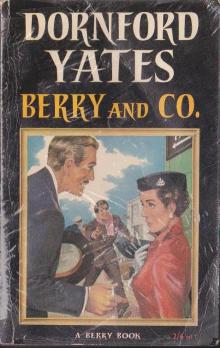 Berry and Co.
Berry and Co.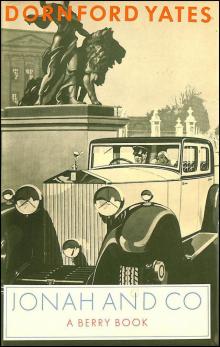 Jonah and Co.
Jonah and Co. The Funny Bone: Short Stories and Amusing Anecdotes for a Dull Hour
The Funny Bone: Short Stories and Amusing Anecdotes for a Dull Hour The Brother of Daphne
The Brother of Daphne Courts of Idleness
Courts of Idleness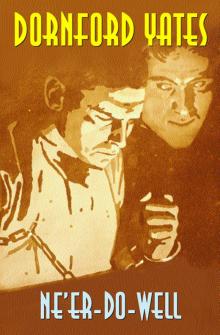 Ne'er Do Well
Ne'er Do Well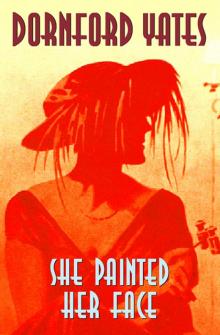 She Painted Her Face
She Painted Her Face Safe Custody and Laughing Bacchante
Safe Custody and Laughing Bacchante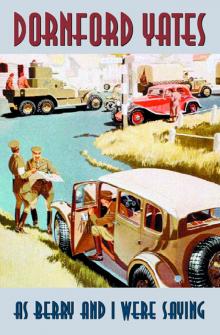 As Berry and I Were Saying
As Berry and I Were Saying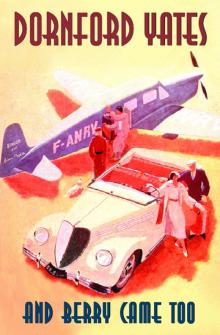 And Berry Came Too
And Berry Came Too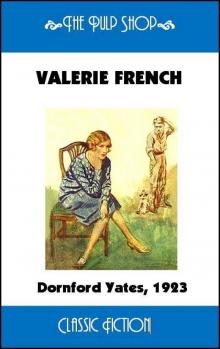 Valerie French (1923)
Valerie French (1923) Brother of Daphne
Brother of Daphne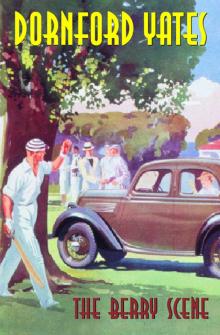 Berry Scene
Berry Scene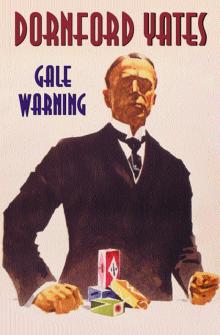 Gale Warning
Gale Warning B-Berry and I Look Back
B-Berry and I Look Back Storm Music (1934)
Storm Music (1934)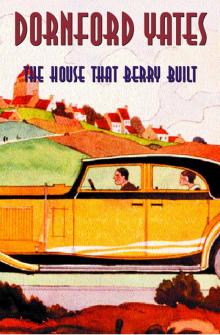 House That Berry Built
House That Berry Built